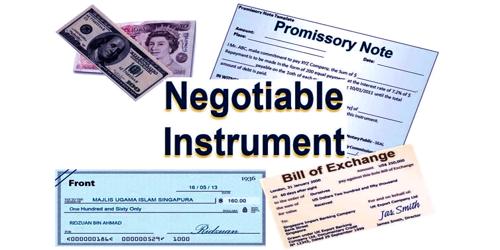Features of Negotiable Instruments
Negotiable Instruments are written contracts whose benefit could be passed on from its original holder to a new holder. It is a signed document that promises a sum of payment to a specified person or the assignee.
Essential Features of Negotiable Instruments are given below:
- Writing and Signature:
Negotiable Instruments must be written and signed by the parties according to the rules relating to Promissory Notes, Bills of Exchange and Cheques. Demand Drafts are also construal as Negotiable Instruments in the limiting case as they have the same property as NI Instruments.
- Money:
Negotiable instruments are payable by legal tender money of India. The liabilities of the parties of Negotiable Instruments are fixed and determined in terms of legal tender money.
- Negotiability:
Negotiable Instruments can be transferred from one person to another by a simple process. In the case of bearer instruments; delivery to the transferee is sufficient. In the case of order instruments, two things are required for a valid transfer: endorsement (i:e., a signature of the holder) and delivery. Any instrument may be made non-transferable by using suitable words, e.g., “pay to X only.”
- Title:
The transferee of a negotiable instrument, when he fulfills certain conditions, is called the holder in due course. The holder in due course gets a good title to the instrument even in cases where the title of the transferred is defective.
- Notice:
It is not necessary to give notice of transfer of a negotiable instrument to the party liable to pay. The transferee can sue in his own name.
- Presumptions:
Certain presumptions apply to all negotiable instruments. Example: It is presumed that there is a consideration. It is not necessary to write in a promissory note the words “for value received” or similar expressions because the payment of consideration is presumed. The words are usually included to create additional evidence of consideration.
- Special Procedure:
A special procedure is provided for suits on promissory notes and bills of exchange (The procedure is prescribed in the Civil Procedure Code). A decree can be obtained much more quickly than it can be in ordinary suits.
- Popularity:
Negotiable instruments are popular in commercial transactions because of their easy negotiability and quick remedies.
- Evidence:
A document which fails to qualify as a negotiable instrument may nevertheless be used as evidence of the fact of indebtedness.
















